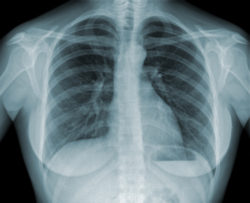Top Class Actions’s website and social media posts use affiliate links. If you make a purchase using such links, we may receive a commission, but it will not result in any additional charges to you. Please review our Affiliate Link Disclosure for more information.

According to the lawsuit, the woman allegedly developed second hand mesothelioma because of her father working around asbestos fibers on daily basis. The woman alleges that the asbestos fibers attached to her father’s clothing and inadvertently exposed her and her family members to the dangerous fibers.
Illinois Central Railroad Company (ICRC) and Canadian National Railway Company (CN) are the named defendants in the asbestos lawsuit, with the claimant alleging the companies supplied and utilized dangerous asbestos products. According to the lawsuit, the plaintiff, Suzanne G., was diagnosed with second hand mesothelioma on Jan. 12, 2017, which she says was a direct consequence of her father’s career as a fireman and locomotive engineer.
As a fireman, Suzanne says, he shoveled coal into the locomotives and ultimately inhaled and ingested asbestos fibers daily from 1955 to 1975 at different company work sites. During his work as a locomotive engineer, Suzanne’s father worked in Louisiana where he was regularly exposed to asbestos found in different parts of the train. These parts included the insulin piping and rail car brake shoes.
Even though Suzanne’s father and other employees were issued some protective gear, Suzanne alleges it was not enough to prevent asbestos fibers from attaching to his clothing.
According to Suzanne’s asbestos lawsuit, her father would rarely leave his cab during his shift and was regularly exposed to asbestos for 12 to 14 hours a day. Suzanne regularly interacted with her father and helped with household chores throughout her childhood like laundry, which directly contributed to her second-hand mesothelioma diagnosis.
Suzanne is filing this asbestos lawsuit, alleging the companies knew or should have known the dangers of both first-hand and second-hand exposure. Suzanne ultimately alleges her second-hand mesothelioma could have been prevented, and now she must contend with her terminal illness.
Second Hand Mesothelioma
Second-hand asbestos exposure occurs when asbestos fibers attach to clothing and are inhaled or swallowed by other family members when they make physical contact with the person or handle the clothes for washing and other purposes. Whether asbestos fibers are inhaled directly on the job or through a loved one’s clothing, the health risks for asbestos exposure remain the same.
Overview of Asbestos Exposure Complications
Mesothelioma is a very rare form of lung cancer, specifically caused by asbestos. When asbestos fibers are inhaled they can become entrapped in the mucus lining of the lungs and eventually fester into cancer cells.
It is important to note that mesothelioma can take up to 50 years before it shows any symptoms. This often results in late diagnosis and limited treatment options for patients. There is currently no cure for mesothelioma, and patients who develop the disease have a much shorter life expectancy.
Asbestos is a fibrous material that was popularly used before the 1980s for various manufacturing purposes, due to its cheap price and resilient features. Asbestos is both fire and chemical resistant which made it ideal for insulation and other purposes in the industrial industry.
Asbestos reached its height in popularity during World War II when numerous United States Navy ships used asbestos for insulation piping. Railroad companies also utilized asbestos for similar purposes, with most of their locomotives containing the fibrous material in different parts of the train.
This Asbestos Lawsuit is Case No. 2:17-cv-13009-KDE-KWR, in the U.S. District Court for the Eastern District of Louisiana.
Do YOU have a legal claim? Fill out the form on this page now for a free, immediate, and confidential case evaluation. The attorneys who work with Top Class Actions will contact you if you qualify to let you know if an individual asbestos lawsuit or asbestos class action lawsuit is best for you. [In general, asbestos mesothelioma lawsuits are filed individually by each plaintiff and are not class actions.] Hurry — statutes of limitations may apply.
ATTORNEY ADVERTISING
Top Class Actions is a Proud Member of the American Bar Association
LEGAL INFORMATION IS NOT LEGAL ADVICE
Top Class Actions Legal Statement
©2008 – 2024 Top Class Actions® LLC
Various Trademarks held by their respective owners
This website is not intended for viewing or usage by European Union citizens.
Get Help – It’s Free
Join a Free Asbestos Mesothelioma Class Action Lawsuit Investigation
If you or a loved one were exposed to asbestos and developed mesothelioma, lung cancer, or cancer in the lining of the lungs, abdomen or chest cavity, you may be able to take legal action against the companies responsible. Don’t delay – in most states the statute of limitations is two years to file an asbestos lawsuit after you’re diagnosed. Obtain a free and confidential case evaluation be filling out the form below.
An attorney will contact you if you qualify to discuss the details of your potential case at no charge to you.
Please Note: If you want to participate in this investigation, it is imperative that you reply to the law firm if they call or email you. Failing to do so may result in you not getting signed up as a client, if you qualify, or getting you dropped as a client.
Oops! We could not locate your form.












